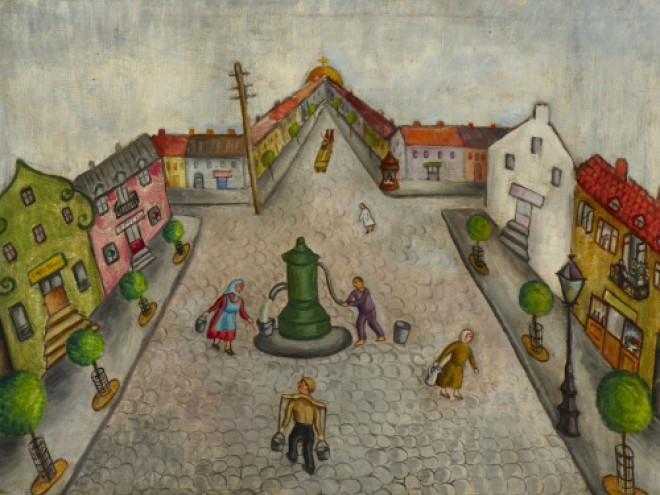What if there was a hidden Jewish village in Poland that escaped the Holocaust? What if eighty years later there was a young woman from that religious village who insists she be divorced from her husband? What if there was a young man, an insignificant orphan, sent away from that village to find her when she disappears? What if this story suddenly grows much larger to encompass matters of assimilation, antisemitism, effects of history on individuals and collective consciousness, political lies which take hold, governmental bureaucracy, social class, economic choices, religion, divisions within the Jewish community, survival, family ties, and love…and you care about them all?
Gross’s memorable work of speculative fiction zings throughout with surprising twists and turns. A reader gasps, and the reviewer is challenged not to give too much away. Gross opens with a small slice of life in traditional, Yiddish-speaking Kreskol, with Yiddishisms defined at the bottom of pages. When his resident historian narrator reports how Kreskol discourages divorce, the reader may assume a late nineteenth century setting. Eighteen pages later, when Pesha vanishes, the narrator zooms the lens back to reveal that Kreskol is surrounded by thick forest. Now three people have gone beyond the town walls. Six pages after that a helicopter thrums overhead, and we realize that Kreskol is living the old ways in our time.
Kreskol has been discovered. Is that a good thing or bad? Even before the barrier breaks in old Kreskol, laughter and pain lie close together. There is humor in the individual exchanges between newlywed Pesha Lindauer, who cannot explain what is wrong with her marriage, and the rabbis and rebbetzins, who dismissively question the finality of her feelings. Lurking, however, is the ominous shadow of violent anger present in Ishmael, her brooding, quiet husband. Social inequality is as rooted as the trees that have isolated the village. There are the yentas who sit comfortably gossiping on a bench in the sun and attend Kreskol’s main synagogue, and the disparaged, who live and attend the synagogue for the poor on the seamy edges of town. Yankel Lewinkopf’s mother, about whom sexual rumors fly after her husband disappears, is one. And, though no one can fault Yankel’s assiduousness, he will always be considered lesser there, unfit to be matched with a bride who is not deformed, even after his mother dies when he is eight.
Laughter and tears. Many in Kresol fall to their knees and weep with joy, sure that the helicopter is a chariot and that the elderly bearded man (actually, a translator) who exits from it must be the Messiah. And then, the newly returned Yankel flatly tells them that they have missed the long-awaited arrival — “The Messiah came many years ago….His name was David Ben Gurion.” Yet, still unwelcome in any of his relatives’ homes, Yankel decides not to stay.
Yankel, the underdog who has been sent out on a knight’s errand which is not his own, holds the intimacy and romantic center of discovery in this story. The baker from Kreskol has always tried to please, to do what was wanted. When he then steps into the dangers of a much larger world, where he does not speak the language or know the mores, we root for him to succeed. Slowly, Yankel’s confidence grows. Sometimes now he is even helped by new friends or chance. He finds love, which is cruelly, violently stolen. Will he persevere? Is his journey perhaps a metaphor for that of the Jewish people?
It is Kreskol’s story, too, as the town splits with the challenge of holding onto its values when faced with the lures of new prosperity and technology. Kreskol also grapples with the struggle to accept knowledge of the horrors that wiped out Jewish communities in much of Europe a half-century before. Prejudices that still remain in greater Poland maneuver to steal its future. Did Kreskol’s reactions affect its future? Should the town turn its back on the world, again?
Alive with human emotion, history and provocative questions that call for debate, Max Gross’s first novel is a discussion group’s dream.
Sharon Elswit, author of The Jewish Story Finder and a school librarian for forty years in NYC, now resides in San Francisco, where she shares tales aloud in a local JCC preschool and volunteers with 826 Valencia to help students write their own stories and poems.



